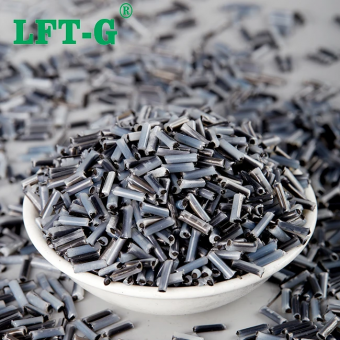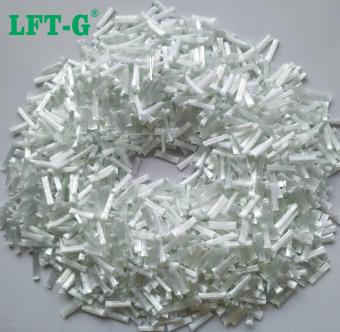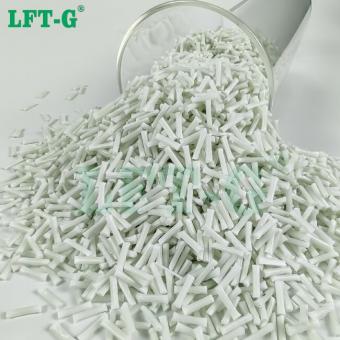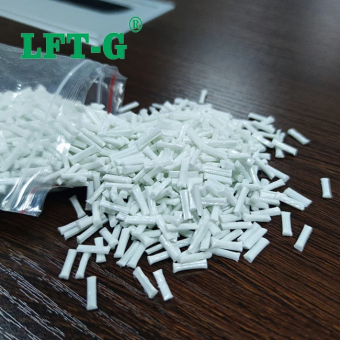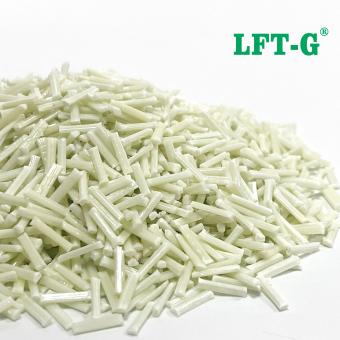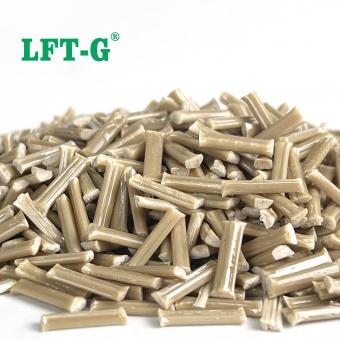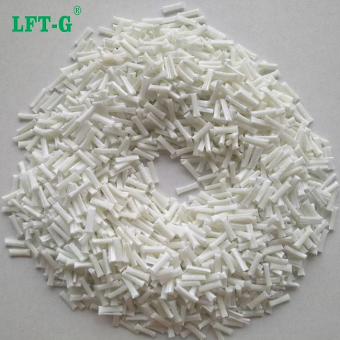-
lft-g PBT modified plastic filling long fiber high performance natural color industrial use injection moldedPBT materials Polybutylene terephathalate (PBT) is a crystalline thermoplastic engineering plastic made by polymerizing dimethyl terephthalate (DMT) and 1,4 butanediol (1,4-Butanediol). Due to the growth of the -CH2- chain of PBT resin, the molecular chain is easy to flex, so the glass transfer temperature is lower than that of PET, and the crystallization speed increases. PBT can also be called thermoplastic polyester plastics, applicable to different processing industries, generally more or less will add additives, or blended with other plastics, with different proportions of additives, can be manufactured with different specifications of the product. Because PBT has heat resistance, weather resistance, chemical resistance, good electrical properties, low water absorption, good gloss, widely used in electronic and electrical appliances, automotive parts, machinery, household goods, etc.. PBT's downstream applications include the automotive, electronics/electrical appliance, and machinery industries. Datasheet for reference Application LGF & SGF Advantages of Long glass fiber reinforced materials Glass fiber reinforced plastic is based on the original pure plastic, adding glass fibers and other additives, so as to improve the scope of use of the material. Generally speaking, most of the glass fiber reinforced materials are used in the structural parts of the products, which is a kind of structural engineering materials, such as: PP, ABS, PA66, PA6, PC, POM, PPO, PET, PBT, PPS and so on. Advantages After glass fiber reinforcement, glass fiber is a high temperature resistant material, therefore, the heat-resistant temperature of reinforced plastics is much higher than before without glass fiber, especially nylon plastics. After glass fiber reinforcement, due to the addition of glass fiber, it restricts the mutual movement of the polymer chain of the plastic, therefore, the shrinkage of the reinforced plastic decreases a lot and the rigidity is greatly improved. After glass fiber reinforced, the reinforced plastic will not stress cracking, at the same time, the impact resistance of the plastic improves a lot. After the glass fiber reinforcement, the glass fiber is a high strength material, which also greatly improves the strength of the plastic, such as: tensile strength, compression strength, bending strength, improve a lot. After glass fiber reinforcement, due to the addition of glass fiber and other additives, the combustion performance of the reinforced plastics decreases a lot, most of the materials can not be ignited, it is a kind of flame-retardant material. Warehouse & Lab Customers & Us Catalog
- Low warpage electronic appliance
- pbt recycle long fiber granules
- PBT pellets lgf 30 polymer
- LFT materials PBT green materials
- 12mm pellets pbt high toughness
- made in China high performance PBT
Tags :
-
Xiamen LFT-G raw material PPS composite long glass fiber for home appliances parts and so onProduct number: PPS-NA-LGF Fiber specification: 20%-60% Feature: 94-VO Flame retardant, high toughness, low warpage, fatigue resistance, good appearance of the product Application: Water heater impeller, pump shell, joint, valve, chemical pump impeller, shell, cooling water impeller, shell, home appliances parts
- 94-VO Flame retardant pps virgin grade
- High toughness self-owing factory
- Low warpage injection molded
- Water heater impeller supplier price
- Pump shell high mechanical properties
- Sample available best price
Tags :
-
Xiamen LFT-G Thermoplastic resin reinforced PBT Long glass fiber addition high qualityProduct grade: General grade Fiber specification: 20%-60% Product feature: High toughness, Low warpage Product application: Electronic appliances, Machinery parts etc.
- PBT resin high mechanical properties
- Electronic appliances composites
- sample available pbt
- Natural color widely applications
- Fiber filling material compounds
- High toughness industry use
Tags :
-
Xiamen LFT-G Polybutylene terephthalate contain long glass fiber reinforced PBT compoundsProduct grade: General grade Fiber specification: 20%-60% Product feature: High toughness, Low warpage Product application: Electronic appliances, Machinery parts etc.
- PBT resin great mechanical strength
- Electronic appliances use PBT-GF instead metal
- sample available PBT self factory made good price
- Natural color PBT filling LGF 20%-60%
- Fiber filling material injection molded PBT
- High toughness and strength PBT fiberglass
Tags :
-
Xiamen LFT Polylactic Acid compounds fill carbon fiber high performance natural colorWhat is carbon fiber PLA? Carbon fiber reinforced PLA is an excellent material, strong, lightweight, with excellent layer bonding and low warpage. It has excellent layer adhesion and low warpage. Carbon fiber filaments are not as strong" as other 3D materials, but are much stiffer. The increased rigidity of carbon fiber means increased structural support, but reduced overall flexibility. It is slightly more brittle than regular PLA. Carbon PLA Specifications Flexural strength: 57 MPa Melting temperature: 190°C- 230°C Tensile strength: 45.5 MPa . Elongation at break: (73°F) 320% Standard tolerance: 0.05mm Layer thickness: 3mm Shore hardness: 45D Density: 1.3 g/cm3 (1300 kg/m3) Heat distortion: 21% to 85°C Shrinkage: very low when cooled to higher ambient temperatures Characteristics Moderate strain at break (8-10%), so the filaments are not very brittle, but very tough Very high melt strength and viscosity Good dimensional accuracy and stability Easy handling on many platforms Highly attractive matte black surface Excellent impact resistance and lightness Applications of carbon fiber PL A material Carbon PLA is the ideal material for frames, supports, housings, propellers, chemical instruments, etc. It is also particularly preferred by drone manufacturers and RC enthusiasts. Ideal for applications requiring maximum stiffness and strength. Other products you may wonder PA6-LCF PP-LCF PEEK-LCF About Long carbon fiber Long carbon fiber reinforced composites offer siginifacant weight savings and provide optimum strength and stiffness properties in reinforced thermoplastics. The excellent machanical properties of long carbon fiber reinforced composites make it an ideal replacement for metals. Combined with the design and manufacturing advantages of injection molded thermoplastics, long carbon fiber composites simplify the re-imagining of components and equipment with demanding performance requirements. Its widespread use in aerospace and other advanced industries makes it a "high-tech" perception of consumers - you can use it to market products and create differentiation from competitors. About us Xiamen LFT composite plastic Co., Ltd is a brand-name company that focuses on LFT&LFRT. Long Glass Fiber Series (LGF) & Long Carbon Fiber Series (LCF). The company's thermoplastic LFT can be used for LFT-G injection molding and extrusion, and can also be used for LFT-D molding. It can be produced according to customer requirements: 5~25mm in length. The company's continuous infiltration reinforced thermoplastics have passed ISO9001&16949 system certification, and the products have obtained lots of national trademarks and patents. We can offer you: 1. LFT & LFRT material technical parameters and leading edge design. 2. Mold front design and recommendations. 3. Provide technical support such as injection molding and extrusion molding.
- PLA pellets lcf 30 polymer Polylactic Acid
- high strength and high toughness reinforced pla pellets
- plastic pla lcf30 producer whole sell pla
- best long carbon fiber pla lcf30 granules
- pla cf20 pla granule price on stock
Tags :
-
Xiamen LFT-G Homopolymer Polypropylene fill Long carbon fiber injection molding high toughnessWhat is the Homo PP? Homopolymerized PP plastics are made by polymerizing a single propylene monomer and do not contain ethylene monomer in the molecular chain. Homopolymerized polypropylene pp plastic has the advantage of better strength. Disadvantages are poor impact resistance (more brittle), poor toughness, poor dimensional stability, easy aging, and poor long-term heat stability performance. PP as a thermoplastic polymer began commercial production in 1957, is the first of the regulated stand-alone polymers. Its historical significance is further reflected in the fact that it has been the fastest growing major thermoplastic and has a very wide range of applications within the thermoplastic field, especially in fiber and filament, film extrusion, and injection molding processes. HPP-LCF Long carbon fiber reinforced composites offer significant weight savings and provide optimum strength and stiffness properties in reinforced thermoplastics. The excellent mechanical properties of long carbon fiber reinforced composites make it an ideal replacement for metals. Combined with the design and manufacturing advantages of injection molded thermoplastics, long carbon fiber composites simplify the re-imagining of components and equipment with demanding performance requirements. Its widespread use in aerospace and other advanced industries makes it a "high-tech" perception of consumers - you can use it to market products and create differentiation from competitors. Application You can contact us for more detailed information about application Datasheet for your reference Short fiber VS Long fiber Long carbon fiber Xiamen LFT composite plastic Co., Ltd Xiamen LFT composite plastic Co., Ltd is a brand-name company that focuses on LFT&LFRT. Long Glass Fiber Series (LGF) & Long Carbon Fiber Series (LCF). The company's thermoplastic LFT can be used for LFT-G injection molding and extrusion, and can also be used for LFT-D molding. It can be produced according to customer requirements: 5~25mm in length. The company's continuous infiltration reinforced thermoplastics have passed ISO9001&16949 system certification, and the products have obtained lots of national trademarks and patents.
- self owing PP pellets
- high strength and high toughness reinforced pp pellets
- pp cf40 for electrical connector price
- superior waterproof pp granules
- reinforced Polypropylene PP virgin pure materials
Tags :
-
Xiamen LFT Thermoplastic Polyurethane resin filling long glass fiber engineering plastics high strengthTPU introduction Thermoplastic polyurethane (TPU) elastomers are linear polymers formed by the copolymerization of hard and soft chain segments, which have physical properties such as tensile, abrasion and heat resistance, and elasticity similar to rubber. Thanks to the excellent product performance, the application fields of TPU are expanding, including daily consumer goods, construction, medical, military, automotive, agriculture and many other fields. New products and applications are also emerging, such as large-diameter hoses (shale gas extraction), charging cables for new energy vehicles, foamed TPU (ETPU) sports shoes midsoles prepared by supercritical foaming process, invisible braces, etc. Fiber reinforced modified TPU composites TPU has good impact resistance, but in some applications, high modulus of elasticity and very hard material is required. Glass fiber reinforced modification is a common technical means to improve the elastic modulus of the material. Through modification, thermoplastic composites with many advantages such as high elastic modulus, good insulation, heat resistance, good elastic recovery, good corrosion resistance, impact resistance, low coefficient of expansion and dimensional stability can be obtained. Long glass fiber VS Short glass fiber Compared with the short fiber, long fiber has more excellent performance in mechanical properties. It is more suitable for large products and structural parts. It has 1-3 times higher toughness than short fiber, and the tensile strength is increased by 0.5-1 times. Thermoplastics VS Thermosets Thermosets: when heated for the first time, they can soften and flow, and when heated to a certain temperature, they produce a chemical reaction a cross-chain curing and become hard, this change is irreversible, after that, when heated again, they can no longer become soft and flow. Thermoplastic: thermoplastic resin is the main component, and various additives are added to form a plastic. Under certain temperature conditions, plastic can be softened or melted into any shape, and the shape remains unchanged after cooling; this state can be repeated many times and always has plasticity, and this repeated is only a physical change. Advantages Thermosets: Thermoset plastics retain their strength and shape even when heated. This makes thermoset plastics ideal for producing permanent parts and large, strong shapes. In addition, these parts have excellent strength properties (despite their fragility) and do not lose significant strength when exposed to higher operating temperatures. Thermoplastics: Thermoplastics are the most widely used plastics and typically have high chemical and thermal resistance, as well as a high strength structure that is not easily deformed. It is made of thermoplastic resin as the main component with various additives. Thermoplastic products have excellent electrical insulation, with very low dielectric constant and dielectric loss, suitable for high Frequency and high voltage insulation materials. TPU-LGF applications TDS for TPU-LGF Products details Number Length Colour Sample Price MOQ Package Delivery time TPU-NA-LGF30 12mm (can be customized) Natural colour (can be customized) Available Need to be confirmed 25kg 25kg/bag 7-15 days after shipment About us Company Xiamen LFT composite plastic Co., Ltd. is a brand-name company that focuses on LFT&LFRT. Long Glass Fiber Series (LGF) & Long Carbon Fiber Series (LCF). The company's thermoplastic LFT can be used for LFT-G injection molding and extrusion, and can also be used for LFT-D molding. It can be produced according to customer requirements: 5~25mm in length. The company's long-fiber continuous infiltration reinforced thermoplastics have passed ISO9001 &16949 system certification, and the products have obtained lots of national trademarks and patents.
- tpu lgf30 for toe cap enhanced
- self owing tpu pellets instead metal
- tpu different resin lgf reinforced materials
- high strength and high toughness reinforced tpu pellets
- self owing tpu pellets polymer
Tags :
-
Xiamen LFT-G Polybutylene terephthalate Long Glass Fiber Reinforced CompoundsThey are frequently used to replace metal for applications in which light weighting, improved impact strength, elastic modulus, and material strength are required.
- PBT modified plastic gf long glass fiber
- PBT thermoplastic engineering polymer
- GFRP PBT high toughness and rigidity sample available
- LFT PBT glass fiber reinforcement polymer good price
- PBT higher performance light weight instead metal
- low warpage PA6 for car parts
Tags :
-
Xiamen LFT-G Polybutylene terephthalate Long Glass Fiber Reinforced CompoundsThey are frequently used to replace metal for applications in which light weighting, improved impact strength, elastic modulus, and material strength are required.view more
-
LFT-G modified Polyamide 66 filled long glass fiber compoundsPA66-LGF Information PA66 is one of the most produced and widely used polyester series products. It has high grain size, excellent tensile properties, bending properties, tensile strength and other material mechanical properties, and its excellent ultra-low temperature characteristics and organic chemical properties. It is a class of rubber products with wide range of application, stable characteristics, good mechanical properties, high quality insulation, low density, easy processing and molding, self-extinguishing, and good wear resistance. Therefore, it is widely used in vehicles, electronic and electrical, chemical materials, industrial equipment, instrument panels, construction projects and other industries. However, it has high water absorption, poor alkali resistance, dry ultra-low temperature impact, low compressive strength and easy to deform after absorbing moisture, which affects the reliability of goods specifications. People have improved PA66 in a variety of ways, adding PA66 chemical fiber is one of them. After adding glass fiber, its impact force, heat deformation, material mechanical properties, molding processability and acid resistance are significantly improved. Glass fiber is a class of functional raw materials with high quality characteristics. This utility model has the advantages of low cost, non-combustibility, high temperature resistance, acid resistance, high tensile strength, high impact compressive strength, low tensile strength, high quality insulation properties, high quality insulation properties, etc. It is usually used as a raw material to improve organic chemical polymers or functional materials and composites. The most important hazard of proportional limits to raw materials is mechanical properties. The material mechanical properties of modified PA66 are also related to the composition of glass fibers. The tensile strength, bending strength and impact compression strength of PA66 increase with the glass fiber composition after the addition of PA66 chemical fibers. The tensile and flexural strengths of the managed system increased linearly, but the glass fiber composition was 30%. The trend of increasing tensile and flexural strengths showed some improvement. The results show that PA66 can produce a reasonable page layer, which can reasonably transfer the ground stress between the matrix and page, and thus improve the compressive strength of the matrix. PA66-LGF TDS The datasheet was tested by Xiamen LFT, for your reference only. PA66-LGF Application Suitable for many fileds, other application you can ask for our technical advice. Details Number Color Length Sample MOQ Port of Loading Delivery time Payment terms PA66-NA-LGF30 Original color (can be customized) 12mm (can be customized) Available 25kg Xiamen Port 7-15 days after shipment Discussed Xiamen LFT composite plastic Co., Ltd Xiamen LFT composite plastic Co., Ltd. is a brand-name company that focuses on LFT&LFRT. Long Glass Fiber Series (LGF) & Long Carbon Fiber Series (LCF). The company's thermoplastic LFT can be used for LFT-G injection molding and extrusion, and can also be used for LFT-D molding. It can be produced according to customer requirements: 5~25mm in length. The company's long-fiber continuous infiltration reinforced thermoplastics have passed ISO9001 &16949 system certification, and the products have obtained lots of national trademarks and patents. We will offer you: 1. LFT&LFRT material technical parameters and leading edge design 2. Mold front design and recommendations 3. Provide technical support such as injection molding and extrusion molding.
- self owing pa66 pellets thermoplastic resin
- high strength and high toughness reinforced pa66 pellets
- best long glass fiber pa66 lgf30 granules
- PA66 6 twin screw lgf pellets
- Long Fiber PA66 granules Application
Tags :
-
Xiamen LFT-G reinforced PBT plastic Long glass fiber polymers high qualityProduct grade: General grade Fiber specification: 20%-60% Product feature: High toughness, Low warpage Product application: Electronic appliances, Machinery parts etc.view more
-
LFT-G High Quality Nylon Polyamide 6 Long Carbon Fiber Reinforced PlasticsPolyamide 6 Profile PA66+LGF60 Polytron A60N01 is Natural, 60% Long Glass Fiber Reinforced, Heat Stabilized POLYAMIDE 66, The Glass Fibers are Chemically Coupled to the Polymer Matrix, The material is supplied in pellets that are typically 12mm in length. Fiber length is the length of the pellets. Typical applications include Injection Molding Applications. Production Process of LGF 1. Through the physical and chemical treatment of the original carbon fiber, it removes impurities, improves surface activity, and provides the mechanical properties and durability of pre-soaked materials. 2. Add resin, additives, etc., form a unique formula. Improve flowability, hardness, temperature stability. 3. The pre-treated carbon fiber is placed on the machine, and the resin is evenly covered on its surface. 4. Use the machine to solidify the material, and the fiber and resin are both sufficiently bonded. 5. According to the requirements of the product, cutting particles. What are the advantages and applications of Polyamide 6? Nylon 6 fibers are tough, possessing high tensile strength, elasticity, and luster. The fibers can absorb up to 2.4% of water, although this lowers tensile strength. The glass transition temperature of nylon 6 is 47 °C. Nylon 6 is generally white as a synthetic fiber but can be dyed in a solution bath before production for different color results. The tenacity of nylon 6 is 6–8.5 gf/D with a density of 1.14 g/cm3. Its melting point is 215 °C and can protect heat up to 150 °C on average. The applications of nylon 6 include construction material in many industries, including the automotive industry, electronic and electrotechnical industry, aircraft industry, clothing industry, and medicine. The advantages of nylon 6 are that its fibers are wrinkleproof and highly resistant to abrasion and chemicals such as acids and alkalis. Long fiber reinforced thermoplastics are an excellent option to consider for metal replacement at a fraction of the weight. About Xiamen LFT laboratory Warehouse Xiamen LFT has capabilities to provide assistance to you throughout an entire product launch - through product discussion, performance analysis, composite selection, composite pellet production, after-sales tracking. In addition, we provide guidance on injection molding techniques
- PA6 GFRP engineering plastic
- Manufacturer directly sell good price plastic
- Thermoplastic resin modified polymers
- customization service
- car parts lightweight instead metal
- composites made in China high toughness
Tags :

 e-mail
e-mail English
English français
français Deutsch
Deutsch русский
русский italiano
italiano español
español português
português العربية
العربية 日本語
日本語 한국의
한국의 中文
中文





